Analysis of Volkswagen's International Business Environment Report
VerifiedAdded on 2021/02/20
|13
|3794
|81
Report
AI Summary
This report provides a comprehensive analysis of Volkswagen's international business environment. It begins with an introduction to the multidimensional nature of the international business environment, including cultural differences, political risks, and legal issues. The report then delves into techniques for analyzing the international business environment, such as Porter's Five Forces and PESTEL analysis, and examines the impact of globalization and international trade on national economies. The organizational structure of Volkswagen in the global market is explored, alongside an evaluation of the risks involved in international operations. A detailed SWOT analysis and PESTLE analysis are conducted to assess Volkswagen's micro and macro environments. The report further discusses the benefits, opportunities, and challenges of globalization and international trade, the implications of cultural and regulatory diversity, and the importance of corporate social responsibility and sustainability. Finally, it addresses potential conflicts between corporate strategy and ethical/social responsibilities, comparing and contrasting management approaches for sustainability. The report utilizes Volkswagen as a case study to illustrate these concepts, providing insights into the complexities of operating in the global automotive industry.
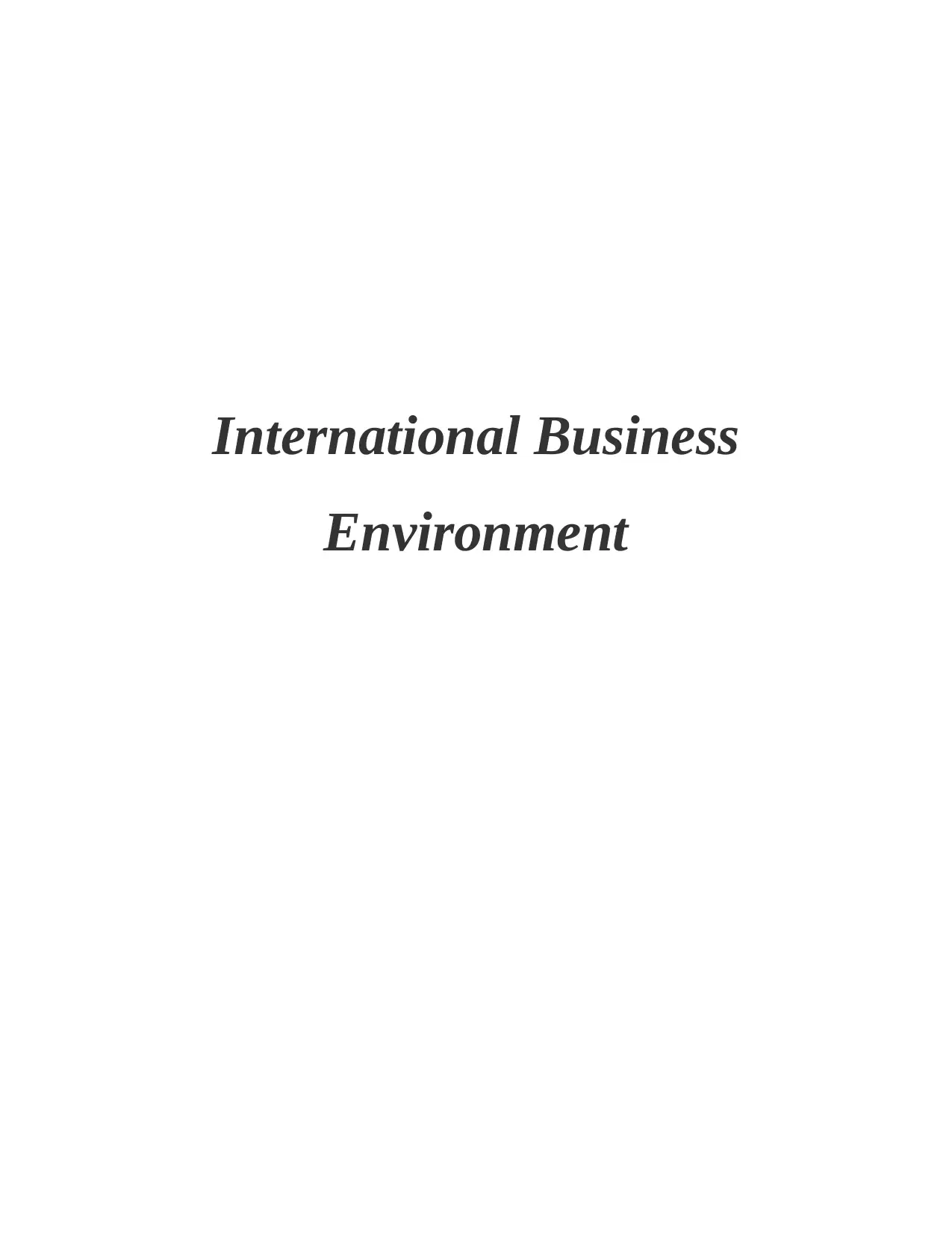
International Business
Environment
Environment
Paraphrase This Document
Need a fresh take? Get an instant paraphrase of this document with our AI Paraphraser
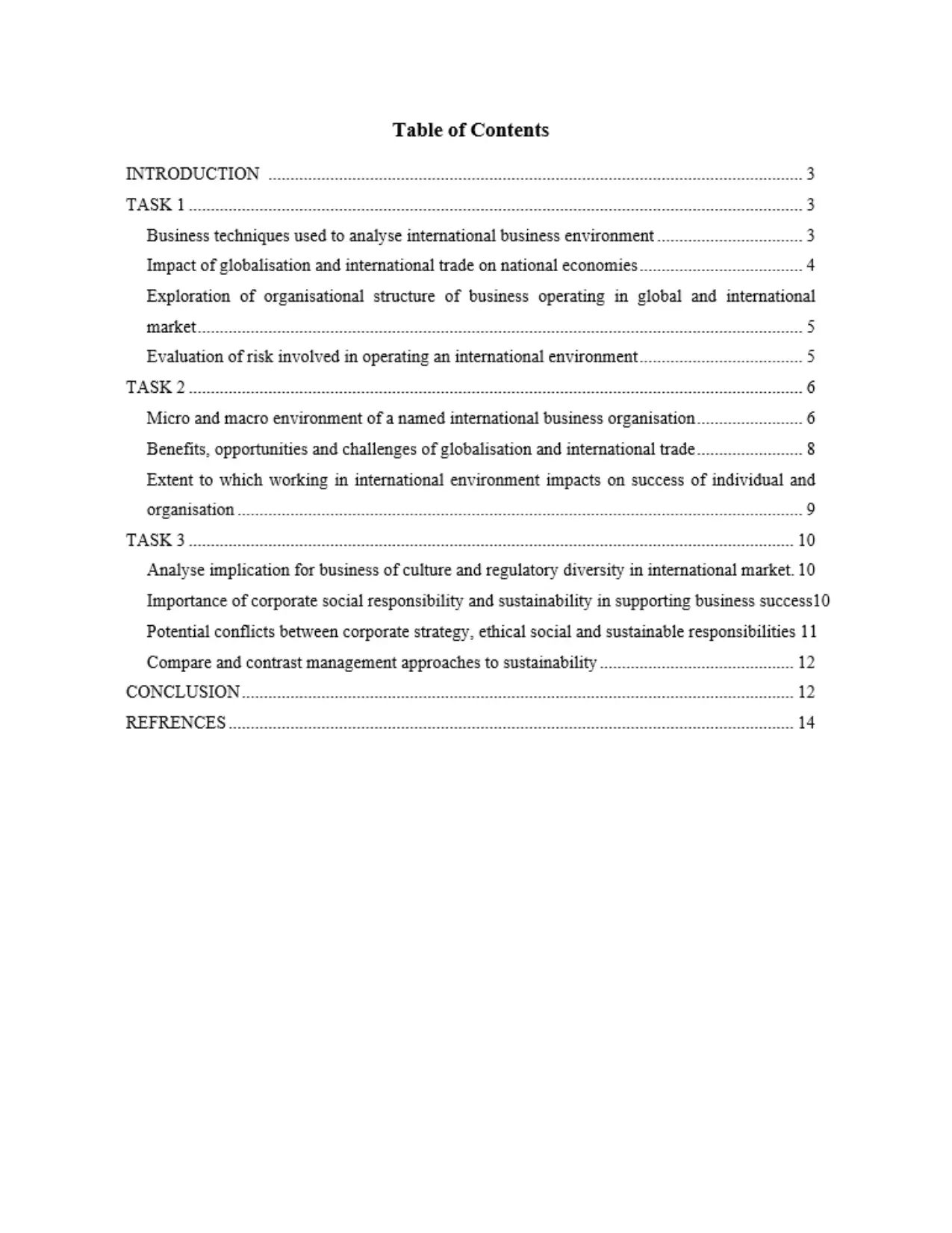
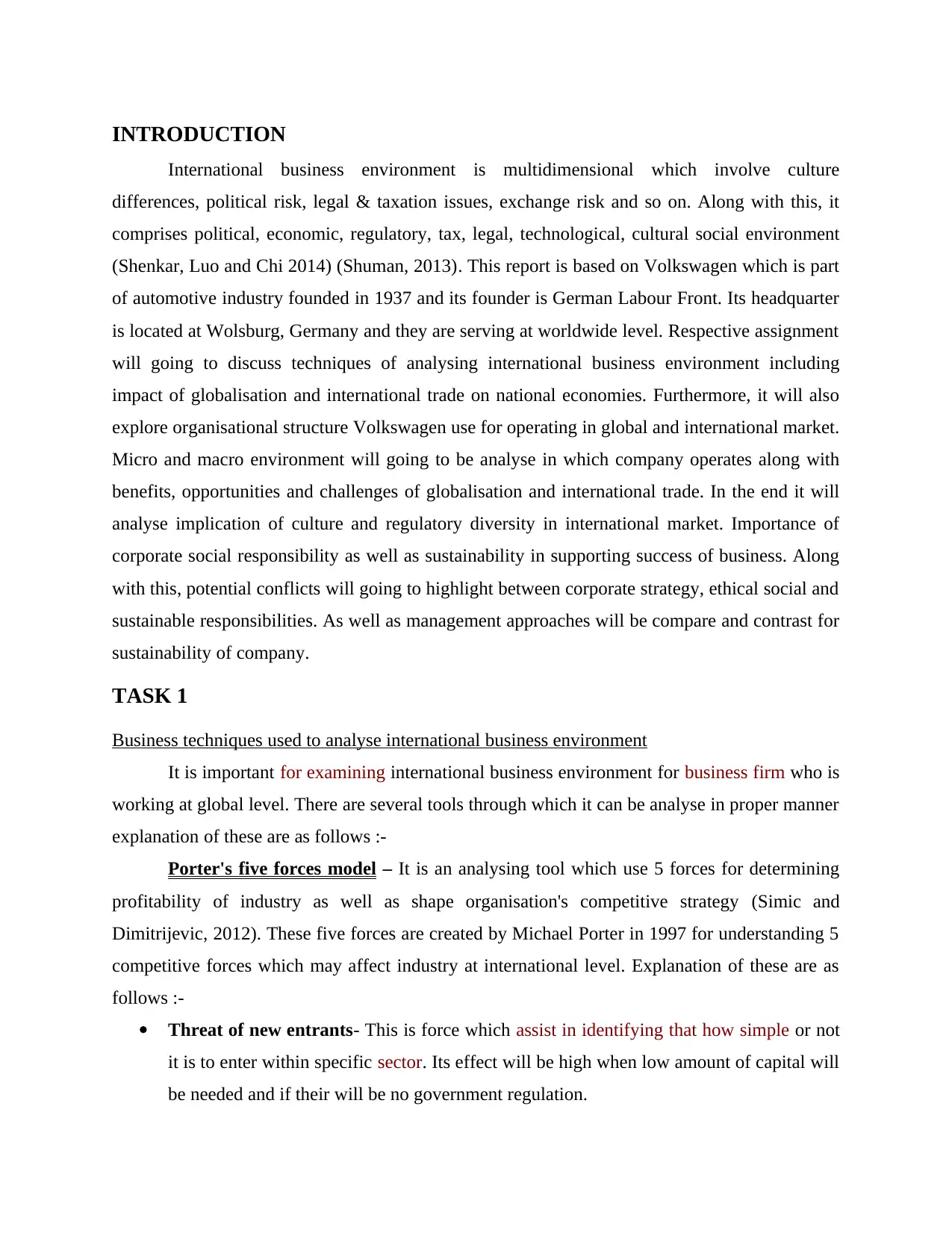
INTRODUCTION
International business environment is multidimensional which involve culture
differences, political risk, legal & taxation issues, exchange risk and so on. Along with this, it
comprises political, economic, regulatory, tax, legal, technological, cultural social environment
(Shenkar, Luo and Chi 2014) (Shuman, 2013). This report is based on Volkswagen which is part
of automotive industry founded in 1937 and its founder is German Labour Front. Its headquarter
is located at Wolsburg, Germany and they are serving at worldwide level. Respective assignment
will going to discuss techniques of analysing international business environment including
impact of globalisation and international trade on national economies. Furthermore, it will also
explore organisational structure Volkswagen use for operating in global and international market.
Micro and macro environment will going to be analyse in which company operates along with
benefits, opportunities and challenges of globalisation and international trade. In the end it will
analyse implication of culture and regulatory diversity in international market. Importance of
corporate social responsibility as well as sustainability in supporting success of business. Along
with this, potential conflicts will going to highlight between corporate strategy, ethical social and
sustainable responsibilities. As well as management approaches will be compare and contrast for
sustainability of company.
TASK 1
Business techniques used to analyse international business environment
It is important for examining international business environment for business firm who is
working at global level. There are several tools through which it can be analyse in proper manner
explanation of these are as follows :-
Porter's five forces model – It is an analysing tool which use 5 forces for determining
profitability of industry as well as shape organisation's competitive strategy (Simic and
Dimitrijevic, 2012). These five forces are created by Michael Porter in 1997 for understanding 5
competitive forces which may affect industry at international level. Explanation of these are as
follows :-
Threat of new entrants- This is force which assist in identifying that how simple or not
it is to enter within specific sector. Its effect will be high when low amount of capital will
be needed and if their will be no government regulation.
International business environment is multidimensional which involve culture
differences, political risk, legal & taxation issues, exchange risk and so on. Along with this, it
comprises political, economic, regulatory, tax, legal, technological, cultural social environment
(Shenkar, Luo and Chi 2014) (Shuman, 2013). This report is based on Volkswagen which is part
of automotive industry founded in 1937 and its founder is German Labour Front. Its headquarter
is located at Wolsburg, Germany and they are serving at worldwide level. Respective assignment
will going to discuss techniques of analysing international business environment including
impact of globalisation and international trade on national economies. Furthermore, it will also
explore organisational structure Volkswagen use for operating in global and international market.
Micro and macro environment will going to be analyse in which company operates along with
benefits, opportunities and challenges of globalisation and international trade. In the end it will
analyse implication of culture and regulatory diversity in international market. Importance of
corporate social responsibility as well as sustainability in supporting success of business. Along
with this, potential conflicts will going to highlight between corporate strategy, ethical social and
sustainable responsibilities. As well as management approaches will be compare and contrast for
sustainability of company.
TASK 1
Business techniques used to analyse international business environment
It is important for examining international business environment for business firm who is
working at global level. There are several tools through which it can be analyse in proper manner
explanation of these are as follows :-
Porter's five forces model – It is an analysing tool which use 5 forces for determining
profitability of industry as well as shape organisation's competitive strategy (Simic and
Dimitrijevic, 2012). These five forces are created by Michael Porter in 1997 for understanding 5
competitive forces which may affect industry at international level. Explanation of these are as
follows :-
Threat of new entrants- This is force which assist in identifying that how simple or not
it is to enter within specific sector. Its effect will be high when low amount of capital will
be needed and if their will be no government regulation.
⊘ This is a preview!⊘
Do you want full access?
Subscribe today to unlock all pages.

Trusted by 1+ million students worldwide
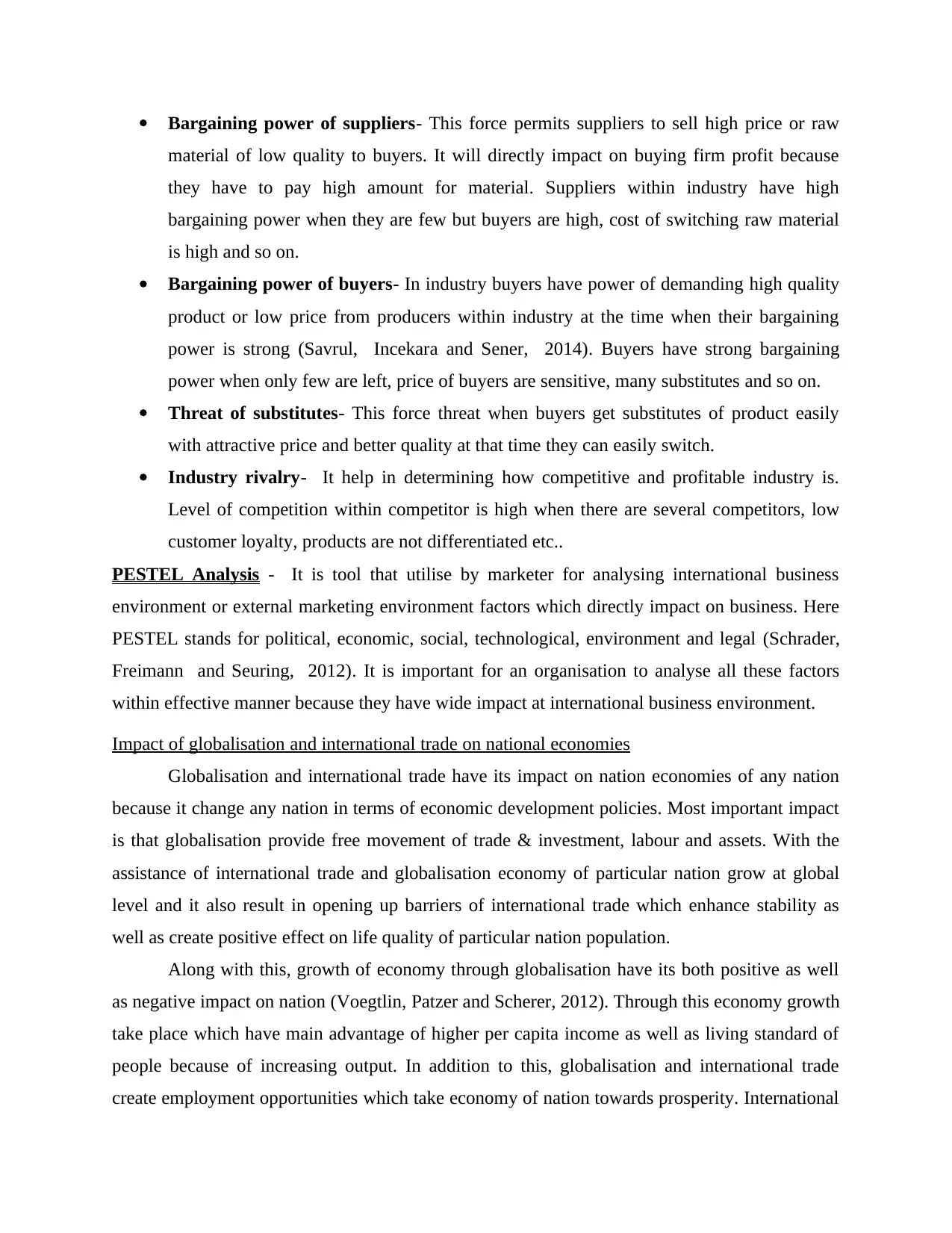
Bargaining power of suppliers- This force permits suppliers to sell high price or raw
material of low quality to buyers. It will directly impact on buying firm profit because
they have to pay high amount for material. Suppliers within industry have high
bargaining power when they are few but buyers are high, cost of switching raw material
is high and so on.
Bargaining power of buyers- In industry buyers have power of demanding high quality
product or low price from producers within industry at the time when their bargaining
power is strong (Savrul, Incekara and Sener, 2014). Buyers have strong bargaining
power when only few are left, price of buyers are sensitive, many substitutes and so on.
Threat of substitutes- This force threat when buyers get substitutes of product easily
with attractive price and better quality at that time they can easily switch.
Industry rivalry- It help in determining how competitive and profitable industry is.
Level of competition within competitor is high when there are several competitors, low
customer loyalty, products are not differentiated etc..
PESTEL Analysis - It is tool that utilise by marketer for analysing international business
environment or external marketing environment factors which directly impact on business. Here
PESTEL stands for political, economic, social, technological, environment and legal (Schrader,
Freimann and Seuring, 2012). It is important for an organisation to analyse all these factors
within effective manner because they have wide impact at international business environment.
Impact of globalisation and international trade on national economies
Globalisation and international trade have its impact on nation economies of any nation
because it change any nation in terms of economic development policies. Most important impact
is that globalisation provide free movement of trade & investment, labour and assets. With the
assistance of international trade and globalisation economy of particular nation grow at global
level and it also result in opening up barriers of international trade which enhance stability as
well as create positive effect on life quality of particular nation population.
Along with this, growth of economy through globalisation have its both positive as well
as negative impact on nation (Voegtlin, Patzer and Scherer, 2012). Through this economy growth
take place which have main advantage of higher per capita income as well as living standard of
people because of increasing output. In addition to this, globalisation and international trade
create employment opportunities which take economy of nation towards prosperity. International
material of low quality to buyers. It will directly impact on buying firm profit because
they have to pay high amount for material. Suppliers within industry have high
bargaining power when they are few but buyers are high, cost of switching raw material
is high and so on.
Bargaining power of buyers- In industry buyers have power of demanding high quality
product or low price from producers within industry at the time when their bargaining
power is strong (Savrul, Incekara and Sener, 2014). Buyers have strong bargaining
power when only few are left, price of buyers are sensitive, many substitutes and so on.
Threat of substitutes- This force threat when buyers get substitutes of product easily
with attractive price and better quality at that time they can easily switch.
Industry rivalry- It help in determining how competitive and profitable industry is.
Level of competition within competitor is high when there are several competitors, low
customer loyalty, products are not differentiated etc..
PESTEL Analysis - It is tool that utilise by marketer for analysing international business
environment or external marketing environment factors which directly impact on business. Here
PESTEL stands for political, economic, social, technological, environment and legal (Schrader,
Freimann and Seuring, 2012). It is important for an organisation to analyse all these factors
within effective manner because they have wide impact at international business environment.
Impact of globalisation and international trade on national economies
Globalisation and international trade have its impact on nation economies of any nation
because it change any nation in terms of economic development policies. Most important impact
is that globalisation provide free movement of trade & investment, labour and assets. With the
assistance of international trade and globalisation economy of particular nation grow at global
level and it also result in opening up barriers of international trade which enhance stability as
well as create positive effect on life quality of particular nation population.
Along with this, growth of economy through globalisation have its both positive as well
as negative impact on nation (Voegtlin, Patzer and Scherer, 2012). Through this economy growth
take place which have main advantage of higher per capita income as well as living standard of
people because of increasing output. In addition to this, globalisation and international trade
create employment opportunities which take economy of nation towards prosperity. International
Paraphrase This Document
Need a fresh take? Get an instant paraphrase of this document with our AI Paraphraser
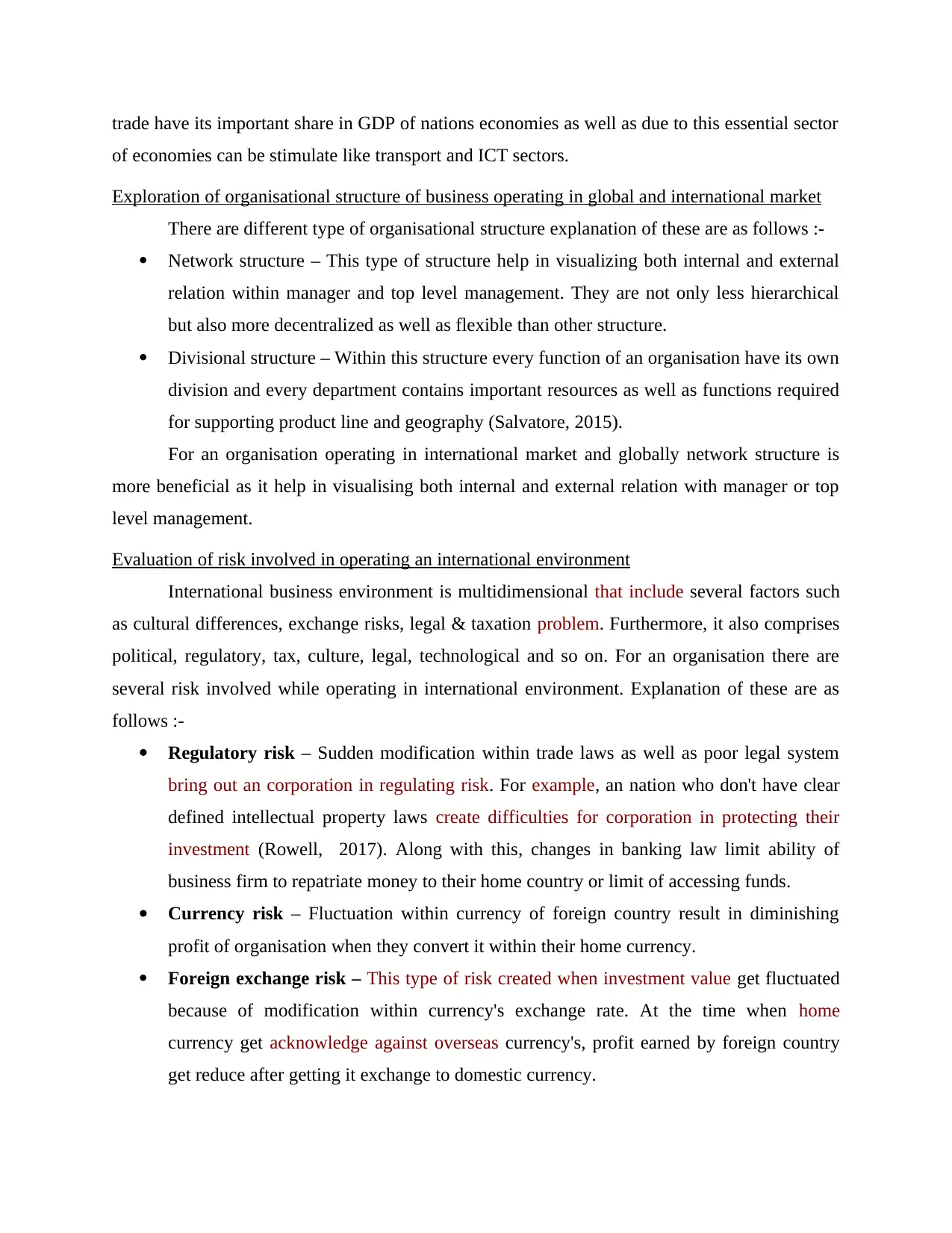
trade have its important share in GDP of nations economies as well as due to this essential sector
of economies can be stimulate like transport and ICT sectors.
Exploration of organisational structure of business operating in global and international market
There are different type of organisational structure explanation of these are as follows :-
Network structure – This type of structure help in visualizing both internal and external
relation within manager and top level management. They are not only less hierarchical
but also more decentralized as well as flexible than other structure.
Divisional structure – Within this structure every function of an organisation have its own
division and every department contains important resources as well as functions required
for supporting product line and geography (Salvatore, 2015).
For an organisation operating in international market and globally network structure is
more beneficial as it help in visualising both internal and external relation with manager or top
level management.
Evaluation of risk involved in operating an international environment
International business environment is multidimensional that include several factors such
as cultural differences, exchange risks, legal & taxation problem. Furthermore, it also comprises
political, regulatory, tax, culture, legal, technological and so on. For an organisation there are
several risk involved while operating in international environment. Explanation of these are as
follows :-
Regulatory risk – Sudden modification within trade laws as well as poor legal system
bring out an corporation in regulating risk. For example, an nation who don't have clear
defined intellectual property laws create difficulties for corporation in protecting their
investment (Rowell, 2017). Along with this, changes in banking law limit ability of
business firm to repatriate money to their home country or limit of accessing funds.
Currency risk – Fluctuation within currency of foreign country result in diminishing
profit of organisation when they convert it within their home currency.
Foreign exchange risk – This type of risk created when investment value get fluctuated
because of modification within currency's exchange rate. At the time when home
currency get acknowledge against overseas currency's, profit earned by foreign country
get reduce after getting it exchange to domestic currency.
of economies can be stimulate like transport and ICT sectors.
Exploration of organisational structure of business operating in global and international market
There are different type of organisational structure explanation of these are as follows :-
Network structure – This type of structure help in visualizing both internal and external
relation within manager and top level management. They are not only less hierarchical
but also more decentralized as well as flexible than other structure.
Divisional structure – Within this structure every function of an organisation have its own
division and every department contains important resources as well as functions required
for supporting product line and geography (Salvatore, 2015).
For an organisation operating in international market and globally network structure is
more beneficial as it help in visualising both internal and external relation with manager or top
level management.
Evaluation of risk involved in operating an international environment
International business environment is multidimensional that include several factors such
as cultural differences, exchange risks, legal & taxation problem. Furthermore, it also comprises
political, regulatory, tax, culture, legal, technological and so on. For an organisation there are
several risk involved while operating in international environment. Explanation of these are as
follows :-
Regulatory risk – Sudden modification within trade laws as well as poor legal system
bring out an corporation in regulating risk. For example, an nation who don't have clear
defined intellectual property laws create difficulties for corporation in protecting their
investment (Rowell, 2017). Along with this, changes in banking law limit ability of
business firm to repatriate money to their home country or limit of accessing funds.
Currency risk – Fluctuation within currency of foreign country result in diminishing
profit of organisation when they convert it within their home currency.
Foreign exchange risk – This type of risk created when investment value get fluctuated
because of modification within currency's exchange rate. At the time when home
currency get acknowledge against overseas currency's, profit earned by foreign country
get reduce after getting it exchange to domestic currency.
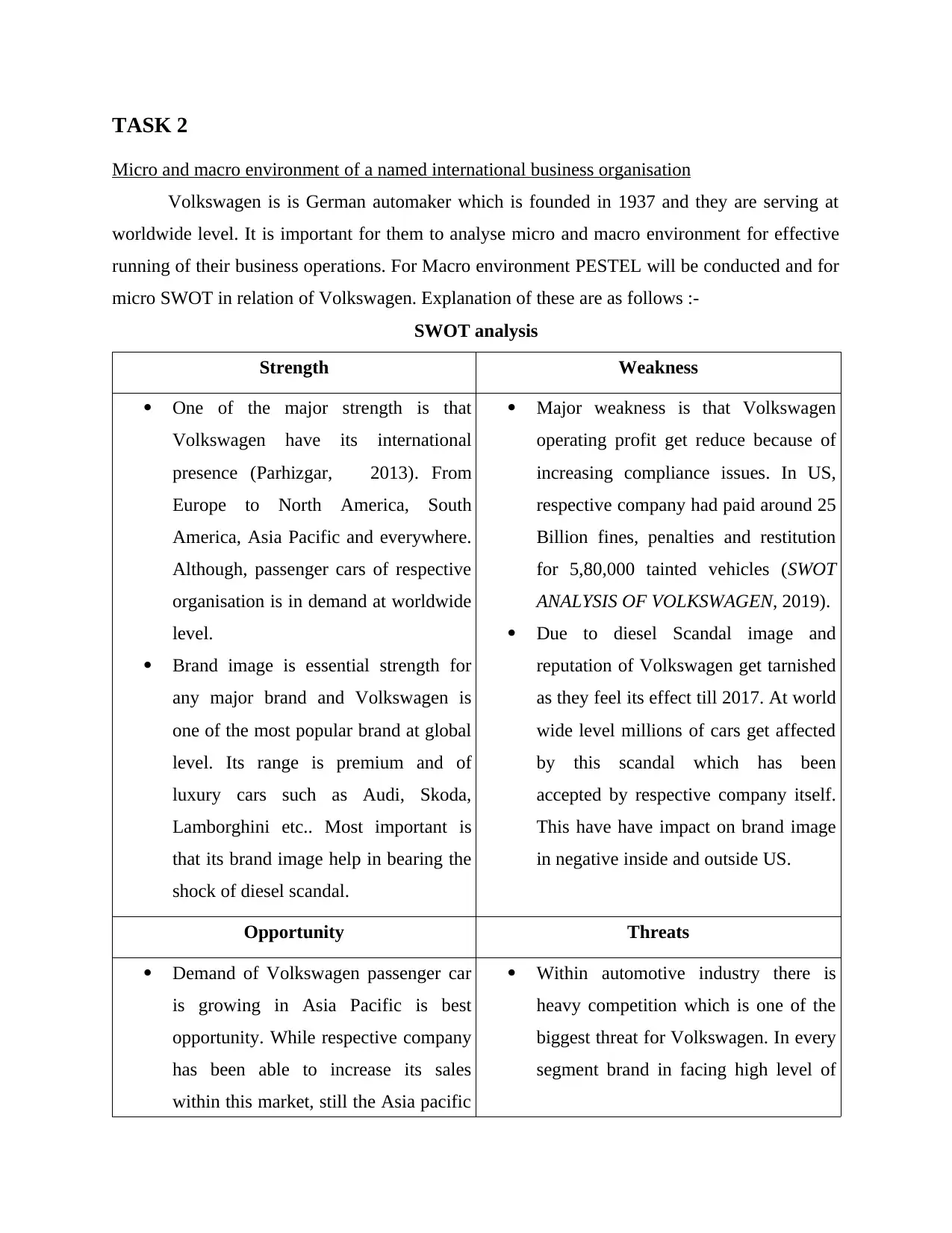
TASK 2
Micro and macro environment of a named international business organisation
Volkswagen is is German automaker which is founded in 1937 and they are serving at
worldwide level. It is important for them to analyse micro and macro environment for effective
running of their business operations. For Macro environment PESTEL will be conducted and for
micro SWOT in relation of Volkswagen. Explanation of these are as follows :-
SWOT analysis
Strength Weakness
One of the major strength is that
Volkswagen have its international
presence (Parhizgar, 2013). From
Europe to North America, South
America, Asia Pacific and everywhere.
Although, passenger cars of respective
organisation is in demand at worldwide
level.
Brand image is essential strength for
any major brand and Volkswagen is
one of the most popular brand at global
level. Its range is premium and of
luxury cars such as Audi, Skoda,
Lamborghini etc.. Most important is
that its brand image help in bearing the
shock of diesel scandal.
Major weakness is that Volkswagen
operating profit get reduce because of
increasing compliance issues. In US,
respective company had paid around 25
Billion fines, penalties and restitution
for 5,80,000 tainted vehicles (SWOT
ANALYSIS OF VOLKSWAGEN, 2019).
Due to diesel Scandal image and
reputation of Volkswagen get tarnished
as they feel its effect till 2017. At world
wide level millions of cars get affected
by this scandal which has been
accepted by respective company itself.
This have have impact on brand image
in negative inside and outside US.
Opportunity Threats
Demand of Volkswagen passenger car
is growing in Asia Pacific is best
opportunity. While respective company
has been able to increase its sales
within this market, still the Asia pacific
Within automotive industry there is
heavy competition which is one of the
biggest threat for Volkswagen. In every
segment brand in facing high level of
Micro and macro environment of a named international business organisation
Volkswagen is is German automaker which is founded in 1937 and they are serving at
worldwide level. It is important for them to analyse micro and macro environment for effective
running of their business operations. For Macro environment PESTEL will be conducted and for
micro SWOT in relation of Volkswagen. Explanation of these are as follows :-
SWOT analysis
Strength Weakness
One of the major strength is that
Volkswagen have its international
presence (Parhizgar, 2013). From
Europe to North America, South
America, Asia Pacific and everywhere.
Although, passenger cars of respective
organisation is in demand at worldwide
level.
Brand image is essential strength for
any major brand and Volkswagen is
one of the most popular brand at global
level. Its range is premium and of
luxury cars such as Audi, Skoda,
Lamborghini etc.. Most important is
that its brand image help in bearing the
shock of diesel scandal.
Major weakness is that Volkswagen
operating profit get reduce because of
increasing compliance issues. In US,
respective company had paid around 25
Billion fines, penalties and restitution
for 5,80,000 tainted vehicles (SWOT
ANALYSIS OF VOLKSWAGEN, 2019).
Due to diesel Scandal image and
reputation of Volkswagen get tarnished
as they feel its effect till 2017. At world
wide level millions of cars get affected
by this scandal which has been
accepted by respective company itself.
This have have impact on brand image
in negative inside and outside US.
Opportunity Threats
Demand of Volkswagen passenger car
is growing in Asia Pacific is best
opportunity. While respective company
has been able to increase its sales
within this market, still the Asia pacific
Within automotive industry there is
heavy competition which is one of the
biggest threat for Volkswagen. In every
segment brand in facing high level of
⊘ This is a preview!⊘
Do you want full access?
Subscribe today to unlock all pages.

Trusted by 1+ million students worldwide
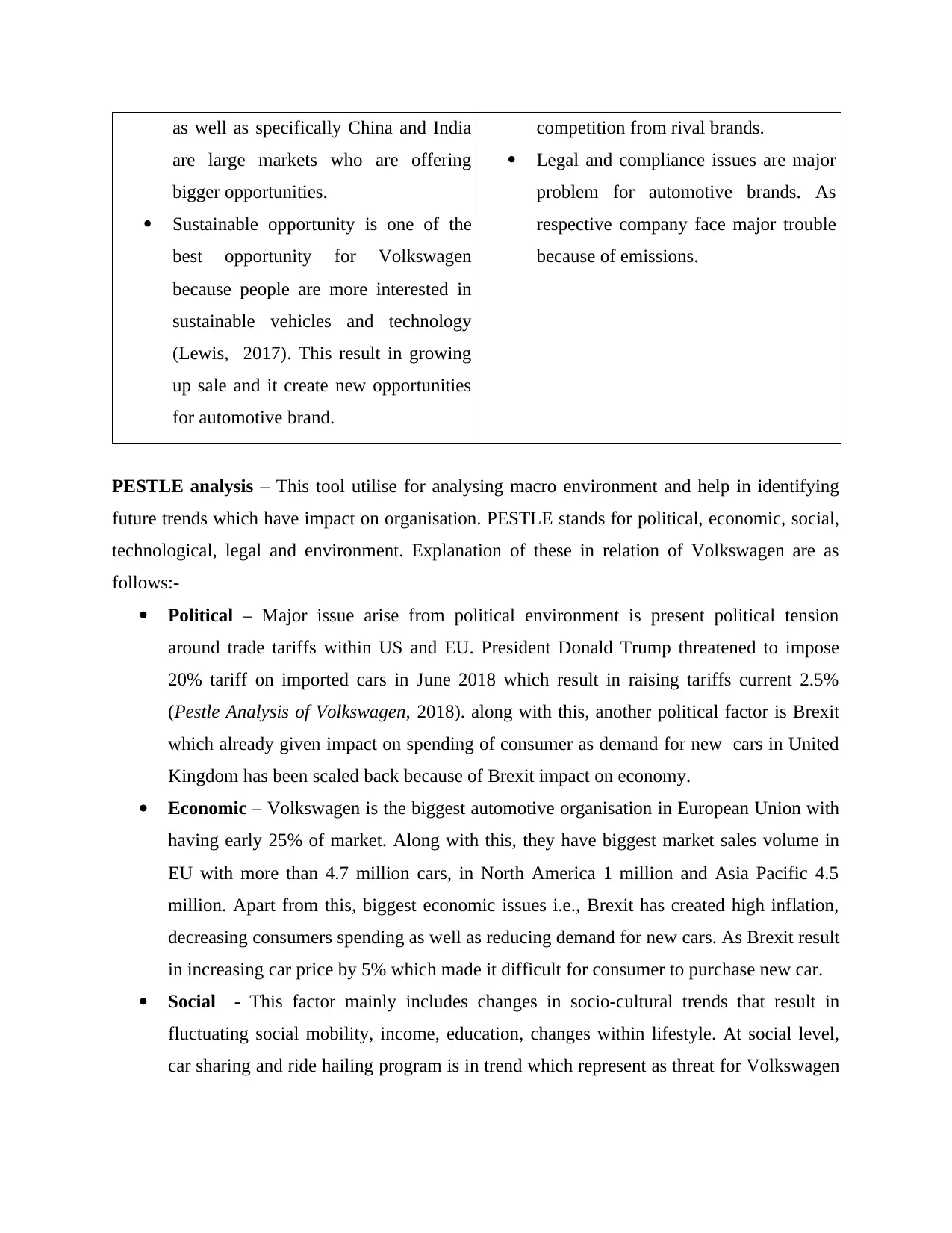
as well as specifically China and India
are large markets who are offering
bigger opportunities.
Sustainable opportunity is one of the
best opportunity for Volkswagen
because people are more interested in
sustainable vehicles and technology
(Lewis, 2017). This result in growing
up sale and it create new opportunities
for automotive brand.
competition from rival brands.
Legal and compliance issues are major
problem for automotive brands. As
respective company face major trouble
because of emissions.
PESTLE analysis – This tool utilise for analysing macro environment and help in identifying
future trends which have impact on organisation. PESTLE stands for political, economic, social,
technological, legal and environment. Explanation of these in relation of Volkswagen are as
follows:-
Political – Major issue arise from political environment is present political tension
around trade tariffs within US and EU. President Donald Trump threatened to impose
20% tariff on imported cars in June 2018 which result in raising tariffs current 2.5%
(Pestle Analysis of Volkswagen, 2018). along with this, another political factor is Brexit
which already given impact on spending of consumer as demand for new cars in United
Kingdom has been scaled back because of Brexit impact on economy.
Economic – Volkswagen is the biggest automotive organisation in European Union with
having early 25% of market. Along with this, they have biggest market sales volume in
EU with more than 4.7 million cars, in North America 1 million and Asia Pacific 4.5
million. Apart from this, biggest economic issues i.e., Brexit has created high inflation,
decreasing consumers spending as well as reducing demand for new cars. As Brexit result
in increasing car price by 5% which made it difficult for consumer to purchase new car.
Social - This factor mainly includes changes in socio-cultural trends that result in
fluctuating social mobility, income, education, changes within lifestyle. At social level,
car sharing and ride hailing program is in trend which represent as threat for Volkswagen
are large markets who are offering
bigger opportunities.
Sustainable opportunity is one of the
best opportunity for Volkswagen
because people are more interested in
sustainable vehicles and technology
(Lewis, 2017). This result in growing
up sale and it create new opportunities
for automotive brand.
competition from rival brands.
Legal and compliance issues are major
problem for automotive brands. As
respective company face major trouble
because of emissions.
PESTLE analysis – This tool utilise for analysing macro environment and help in identifying
future trends which have impact on organisation. PESTLE stands for political, economic, social,
technological, legal and environment. Explanation of these in relation of Volkswagen are as
follows:-
Political – Major issue arise from political environment is present political tension
around trade tariffs within US and EU. President Donald Trump threatened to impose
20% tariff on imported cars in June 2018 which result in raising tariffs current 2.5%
(Pestle Analysis of Volkswagen, 2018). along with this, another political factor is Brexit
which already given impact on spending of consumer as demand for new cars in United
Kingdom has been scaled back because of Brexit impact on economy.
Economic – Volkswagen is the biggest automotive organisation in European Union with
having early 25% of market. Along with this, they have biggest market sales volume in
EU with more than 4.7 million cars, in North America 1 million and Asia Pacific 4.5
million. Apart from this, biggest economic issues i.e., Brexit has created high inflation,
decreasing consumers spending as well as reducing demand for new cars. As Brexit result
in increasing car price by 5% which made it difficult for consumer to purchase new car.
Social - This factor mainly includes changes in socio-cultural trends that result in
fluctuating social mobility, income, education, changes within lifestyle. At social level,
car sharing and ride hailing program is in trend which represent as threat for Volkswagen
Paraphrase This Document
Need a fresh take? Get an instant paraphrase of this document with our AI Paraphraser
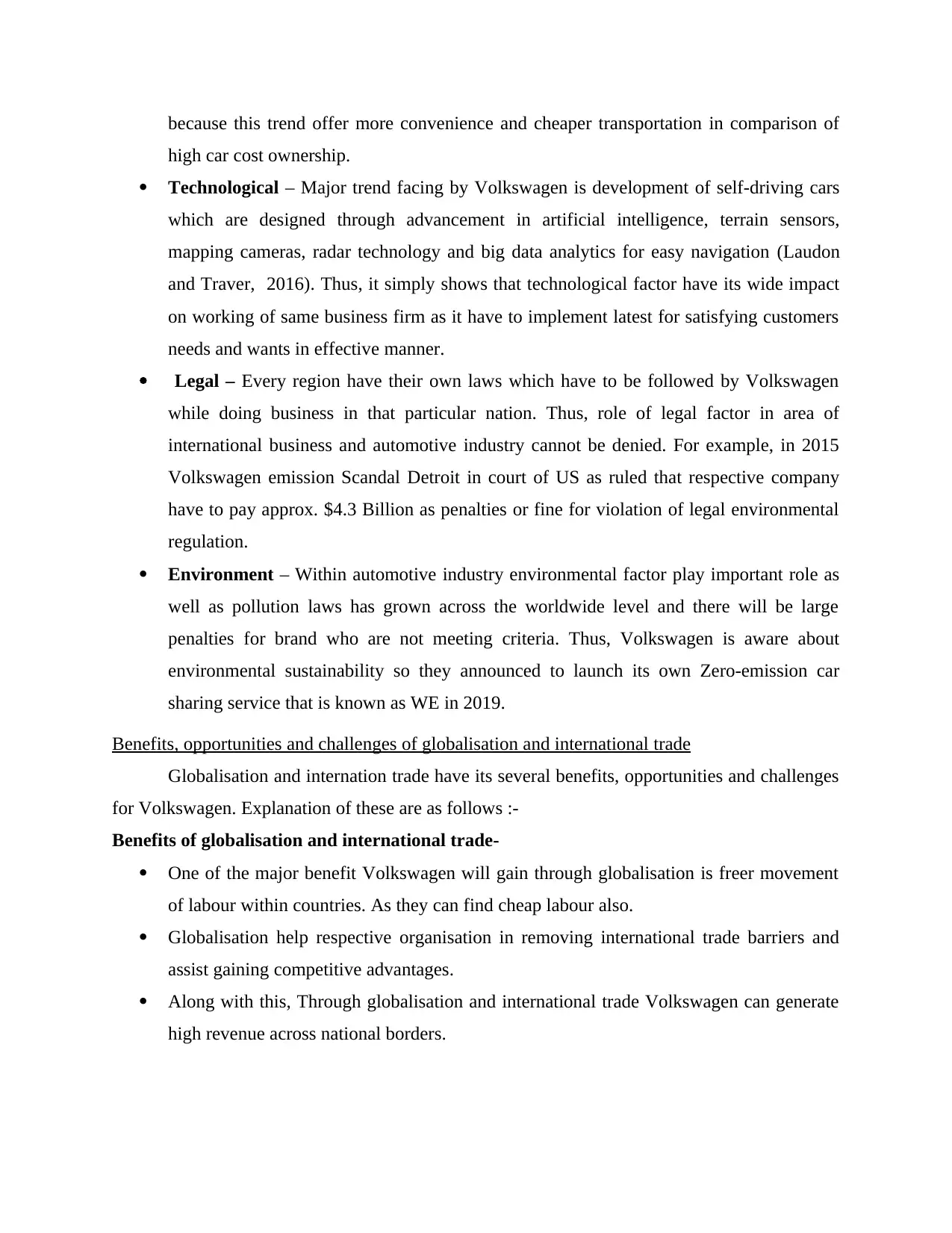
because this trend offer more convenience and cheaper transportation in comparison of
high car cost ownership.
Technological – Major trend facing by Volkswagen is development of self-driving cars
which are designed through advancement in artificial intelligence, terrain sensors,
mapping cameras, radar technology and big data analytics for easy navigation (Laudon
and Traver, 2016). Thus, it simply shows that technological factor have its wide impact
on working of same business firm as it have to implement latest for satisfying customers
needs and wants in effective manner.
Legal – Every region have their own laws which have to be followed by Volkswagen
while doing business in that particular nation. Thus, role of legal factor in area of
international business and automotive industry cannot be denied. For example, in 2015
Volkswagen emission Scandal Detroit in court of US as ruled that respective company
have to pay approx. $4.3 Billion as penalties or fine for violation of legal environmental
regulation.
Environment – Within automotive industry environmental factor play important role as
well as pollution laws has grown across the worldwide level and there will be large
penalties for brand who are not meeting criteria. Thus, Volkswagen is aware about
environmental sustainability so they announced to launch its own Zero-emission car
sharing service that is known as WE in 2019.
Benefits, opportunities and challenges of globalisation and international trade
Globalisation and internation trade have its several benefits, opportunities and challenges
for Volkswagen. Explanation of these are as follows :-
Benefits of globalisation and international trade-
One of the major benefit Volkswagen will gain through globalisation is freer movement
of labour within countries. As they can find cheap labour also.
Globalisation help respective organisation in removing international trade barriers and
assist gaining competitive advantages.
Along with this, Through globalisation and international trade Volkswagen can generate
high revenue across national borders.
high car cost ownership.
Technological – Major trend facing by Volkswagen is development of self-driving cars
which are designed through advancement in artificial intelligence, terrain sensors,
mapping cameras, radar technology and big data analytics for easy navigation (Laudon
and Traver, 2016). Thus, it simply shows that technological factor have its wide impact
on working of same business firm as it have to implement latest for satisfying customers
needs and wants in effective manner.
Legal – Every region have their own laws which have to be followed by Volkswagen
while doing business in that particular nation. Thus, role of legal factor in area of
international business and automotive industry cannot be denied. For example, in 2015
Volkswagen emission Scandal Detroit in court of US as ruled that respective company
have to pay approx. $4.3 Billion as penalties or fine for violation of legal environmental
regulation.
Environment – Within automotive industry environmental factor play important role as
well as pollution laws has grown across the worldwide level and there will be large
penalties for brand who are not meeting criteria. Thus, Volkswagen is aware about
environmental sustainability so they announced to launch its own Zero-emission car
sharing service that is known as WE in 2019.
Benefits, opportunities and challenges of globalisation and international trade
Globalisation and internation trade have its several benefits, opportunities and challenges
for Volkswagen. Explanation of these are as follows :-
Benefits of globalisation and international trade-
One of the major benefit Volkswagen will gain through globalisation is freer movement
of labour within countries. As they can find cheap labour also.
Globalisation help respective organisation in removing international trade barriers and
assist gaining competitive advantages.
Along with this, Through globalisation and international trade Volkswagen can generate
high revenue across national borders.
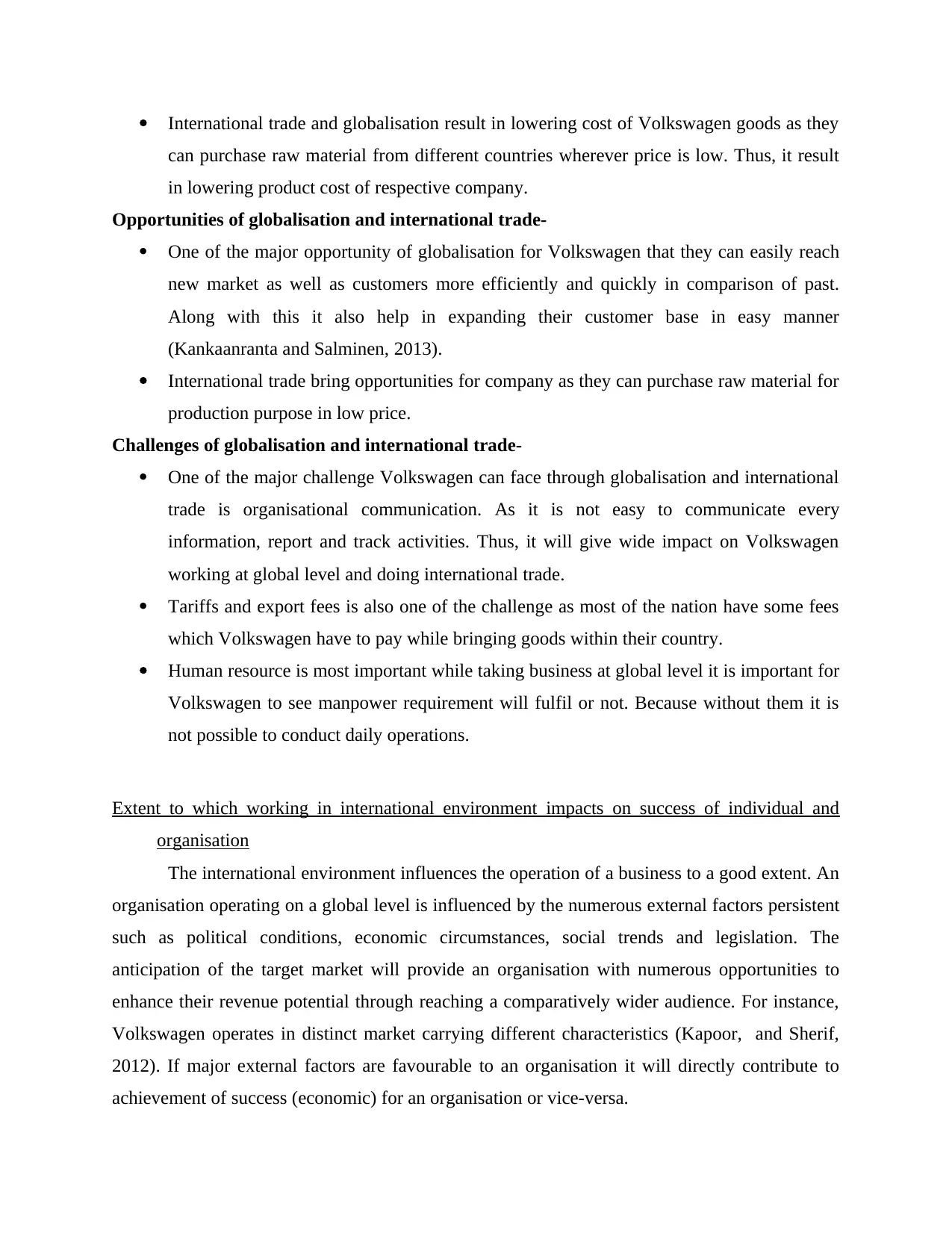
International trade and globalisation result in lowering cost of Volkswagen goods as they
can purchase raw material from different countries wherever price is low. Thus, it result
in lowering product cost of respective company.
Opportunities of globalisation and international trade-
One of the major opportunity of globalisation for Volkswagen that they can easily reach
new market as well as customers more efficiently and quickly in comparison of past.
Along with this it also help in expanding their customer base in easy manner
(Kankaanranta and Salminen, 2013).
International trade bring opportunities for company as they can purchase raw material for
production purpose in low price.
Challenges of globalisation and international trade-
One of the major challenge Volkswagen can face through globalisation and international
trade is organisational communication. As it is not easy to communicate every
information, report and track activities. Thus, it will give wide impact on Volkswagen
working at global level and doing international trade.
Tariffs and export fees is also one of the challenge as most of the nation have some fees
which Volkswagen have to pay while bringing goods within their country.
Human resource is most important while taking business at global level it is important for
Volkswagen to see manpower requirement will fulfil or not. Because without them it is
not possible to conduct daily operations.
Extent to which working in international environment impacts on success of individual and
organisation
The international environment influences the operation of a business to a good extent. An
organisation operating on a global level is influenced by the numerous external factors persistent
such as political conditions, economic circumstances, social trends and legislation. The
anticipation of the target market will provide an organisation with numerous opportunities to
enhance their revenue potential through reaching a comparatively wider audience. For instance,
Volkswagen operates in distinct market carrying different characteristics (Kapoor, and Sherif,
2012). If major external factors are favourable to an organisation it will directly contribute to
achievement of success (economic) for an organisation or vice-versa.
can purchase raw material from different countries wherever price is low. Thus, it result
in lowering product cost of respective company.
Opportunities of globalisation and international trade-
One of the major opportunity of globalisation for Volkswagen that they can easily reach
new market as well as customers more efficiently and quickly in comparison of past.
Along with this it also help in expanding their customer base in easy manner
(Kankaanranta and Salminen, 2013).
International trade bring opportunities for company as they can purchase raw material for
production purpose in low price.
Challenges of globalisation and international trade-
One of the major challenge Volkswagen can face through globalisation and international
trade is organisational communication. As it is not easy to communicate every
information, report and track activities. Thus, it will give wide impact on Volkswagen
working at global level and doing international trade.
Tariffs and export fees is also one of the challenge as most of the nation have some fees
which Volkswagen have to pay while bringing goods within their country.
Human resource is most important while taking business at global level it is important for
Volkswagen to see manpower requirement will fulfil or not. Because without them it is
not possible to conduct daily operations.
Extent to which working in international environment impacts on success of individual and
organisation
The international environment influences the operation of a business to a good extent. An
organisation operating on a global level is influenced by the numerous external factors persistent
such as political conditions, economic circumstances, social trends and legislation. The
anticipation of the target market will provide an organisation with numerous opportunities to
enhance their revenue potential through reaching a comparatively wider audience. For instance,
Volkswagen operates in distinct market carrying different characteristics (Kapoor, and Sherif,
2012). If major external factors are favourable to an organisation it will directly contribute to
achievement of success (economic) for an organisation or vice-versa.
⊘ This is a preview!⊘
Do you want full access?
Subscribe today to unlock all pages.

Trusted by 1+ million students worldwide
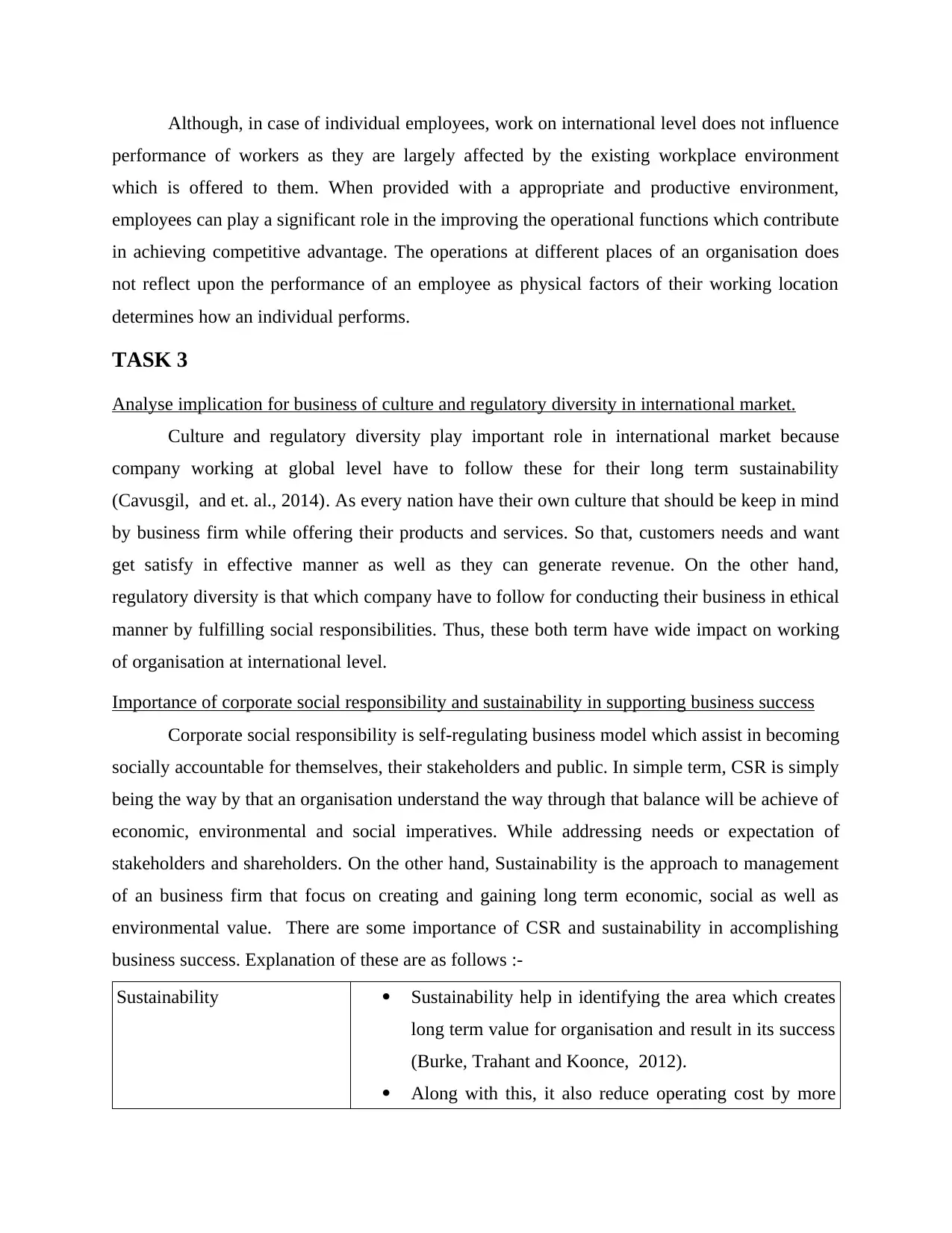
Although, in case of individual employees, work on international level does not influence
performance of workers as they are largely affected by the existing workplace environment
which is offered to them. When provided with a appropriate and productive environment,
employees can play a significant role in the improving the operational functions which contribute
in achieving competitive advantage. The operations at different places of an organisation does
not reflect upon the performance of an employee as physical factors of their working location
determines how an individual performs.
TASK 3
Analyse implication for business of culture and regulatory diversity in international market.
Culture and regulatory diversity play important role in international market because
company working at global level have to follow these for their long term sustainability
(Cavusgil, and et. al., 2014). As every nation have their own culture that should be keep in mind
by business firm while offering their products and services. So that, customers needs and want
get satisfy in effective manner as well as they can generate revenue. On the other hand,
regulatory diversity is that which company have to follow for conducting their business in ethical
manner by fulfilling social responsibilities. Thus, these both term have wide impact on working
of organisation at international level.
Importance of corporate social responsibility and sustainability in supporting business success
Corporate social responsibility is self-regulating business model which assist in becoming
socially accountable for themselves, their stakeholders and public. In simple term, CSR is simply
being the way by that an organisation understand the way through that balance will be achieve of
economic, environmental and social imperatives. While addressing needs or expectation of
stakeholders and shareholders. On the other hand, Sustainability is the approach to management
of an business firm that focus on creating and gaining long term economic, social as well as
environmental value. There are some importance of CSR and sustainability in accomplishing
business success. Explanation of these are as follows :-
Sustainability Sustainability help in identifying the area which creates
long term value for organisation and result in its success
(Burke, Trahant and Koonce, 2012).
Along with this, it also reduce operating cost by more
performance of workers as they are largely affected by the existing workplace environment
which is offered to them. When provided with a appropriate and productive environment,
employees can play a significant role in the improving the operational functions which contribute
in achieving competitive advantage. The operations at different places of an organisation does
not reflect upon the performance of an employee as physical factors of their working location
determines how an individual performs.
TASK 3
Analyse implication for business of culture and regulatory diversity in international market.
Culture and regulatory diversity play important role in international market because
company working at global level have to follow these for their long term sustainability
(Cavusgil, and et. al., 2014). As every nation have their own culture that should be keep in mind
by business firm while offering their products and services. So that, customers needs and want
get satisfy in effective manner as well as they can generate revenue. On the other hand,
regulatory diversity is that which company have to follow for conducting their business in ethical
manner by fulfilling social responsibilities. Thus, these both term have wide impact on working
of organisation at international level.
Importance of corporate social responsibility and sustainability in supporting business success
Corporate social responsibility is self-regulating business model which assist in becoming
socially accountable for themselves, their stakeholders and public. In simple term, CSR is simply
being the way by that an organisation understand the way through that balance will be achieve of
economic, environmental and social imperatives. While addressing needs or expectation of
stakeholders and shareholders. On the other hand, Sustainability is the approach to management
of an business firm that focus on creating and gaining long term economic, social as well as
environmental value. There are some importance of CSR and sustainability in accomplishing
business success. Explanation of these are as follows :-
Sustainability Sustainability help in identifying the area which creates
long term value for organisation and result in its success
(Burke, Trahant and Koonce, 2012).
Along with this, it also reduce operating cost by more
Paraphrase This Document
Need a fresh take? Get an instant paraphrase of this document with our AI Paraphraser
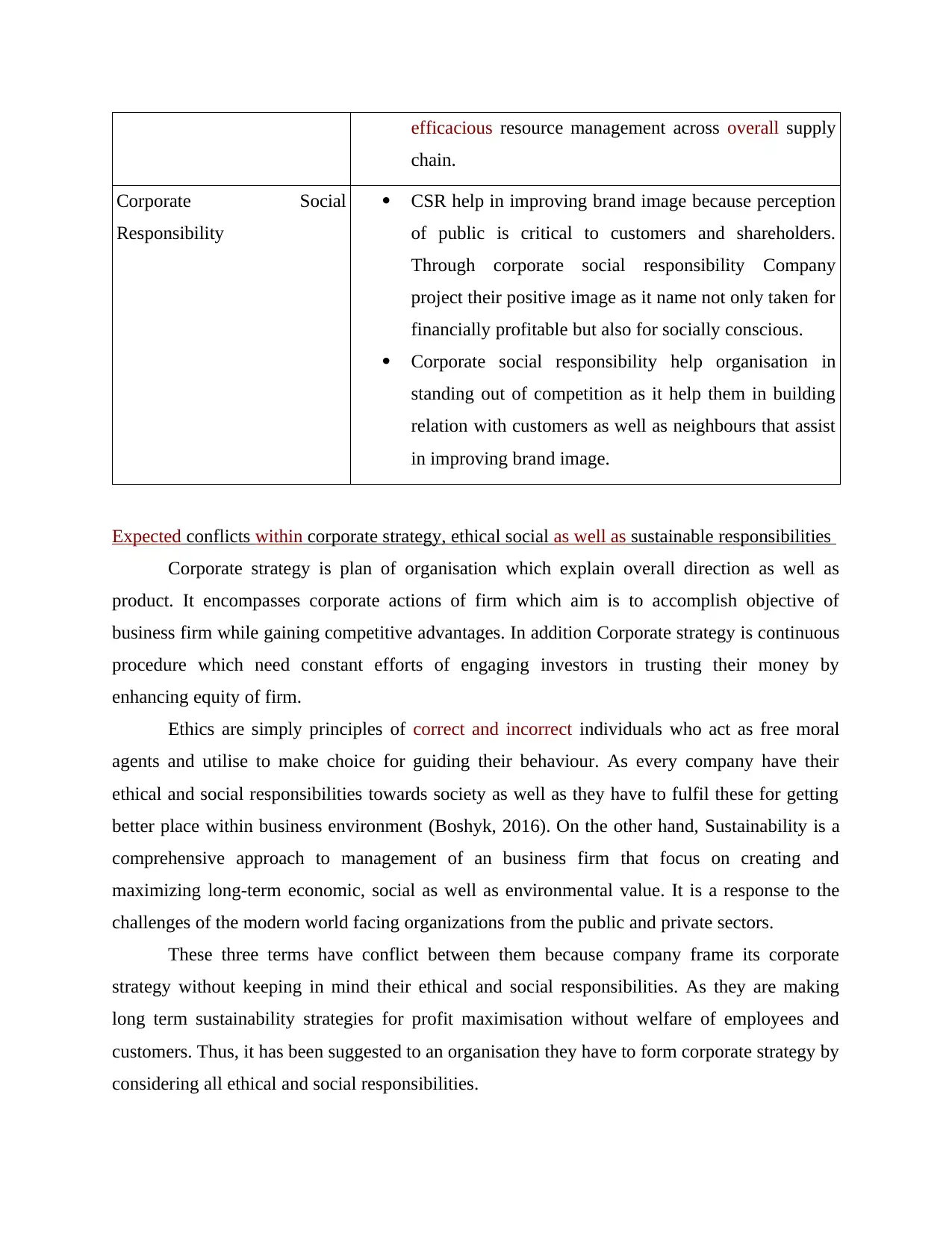
efficacious resource management across overall supply
chain.
Corporate Social
Responsibility
CSR help in improving brand image because perception
of public is critical to customers and shareholders.
Through corporate social responsibility Company
project their positive image as it name not only taken for
financially profitable but also for socially conscious.
Corporate social responsibility help organisation in
standing out of competition as it help them in building
relation with customers as well as neighbours that assist
in improving brand image.
Expected conflicts within corporate strategy, ethical social as well as sustainable responsibilities
Corporate strategy is plan of organisation which explain overall direction as well as
product. It encompasses corporate actions of firm which aim is to accomplish objective of
business firm while gaining competitive advantages. In addition Corporate strategy is continuous
procedure which need constant efforts of engaging investors in trusting their money by
enhancing equity of firm.
Ethics are simply principles of correct and incorrect individuals who act as free moral
agents and utilise to make choice for guiding their behaviour. As every company have their
ethical and social responsibilities towards society as well as they have to fulfil these for getting
better place within business environment (Boshyk, 2016). On the other hand, Sustainability is a
comprehensive approach to management of an business firm that focus on creating and
maximizing long-term economic, social as well as environmental value. It is a response to the
challenges of the modern world facing organizations from the public and private sectors.
These three terms have conflict between them because company frame its corporate
strategy without keeping in mind their ethical and social responsibilities. As they are making
long term sustainability strategies for profit maximisation without welfare of employees and
customers. Thus, it has been suggested to an organisation they have to form corporate strategy by
considering all ethical and social responsibilities.
chain.
Corporate Social
Responsibility
CSR help in improving brand image because perception
of public is critical to customers and shareholders.
Through corporate social responsibility Company
project their positive image as it name not only taken for
financially profitable but also for socially conscious.
Corporate social responsibility help organisation in
standing out of competition as it help them in building
relation with customers as well as neighbours that assist
in improving brand image.
Expected conflicts within corporate strategy, ethical social as well as sustainable responsibilities
Corporate strategy is plan of organisation which explain overall direction as well as
product. It encompasses corporate actions of firm which aim is to accomplish objective of
business firm while gaining competitive advantages. In addition Corporate strategy is continuous
procedure which need constant efforts of engaging investors in trusting their money by
enhancing equity of firm.
Ethics are simply principles of correct and incorrect individuals who act as free moral
agents and utilise to make choice for guiding their behaviour. As every company have their
ethical and social responsibilities towards society as well as they have to fulfil these for getting
better place within business environment (Boshyk, 2016). On the other hand, Sustainability is a
comprehensive approach to management of an business firm that focus on creating and
maximizing long-term economic, social as well as environmental value. It is a response to the
challenges of the modern world facing organizations from the public and private sectors.
These three terms have conflict between them because company frame its corporate
strategy without keeping in mind their ethical and social responsibilities. As they are making
long term sustainability strategies for profit maximisation without welfare of employees and
customers. Thus, it has been suggested to an organisation they have to form corporate strategy by
considering all ethical and social responsibilities.
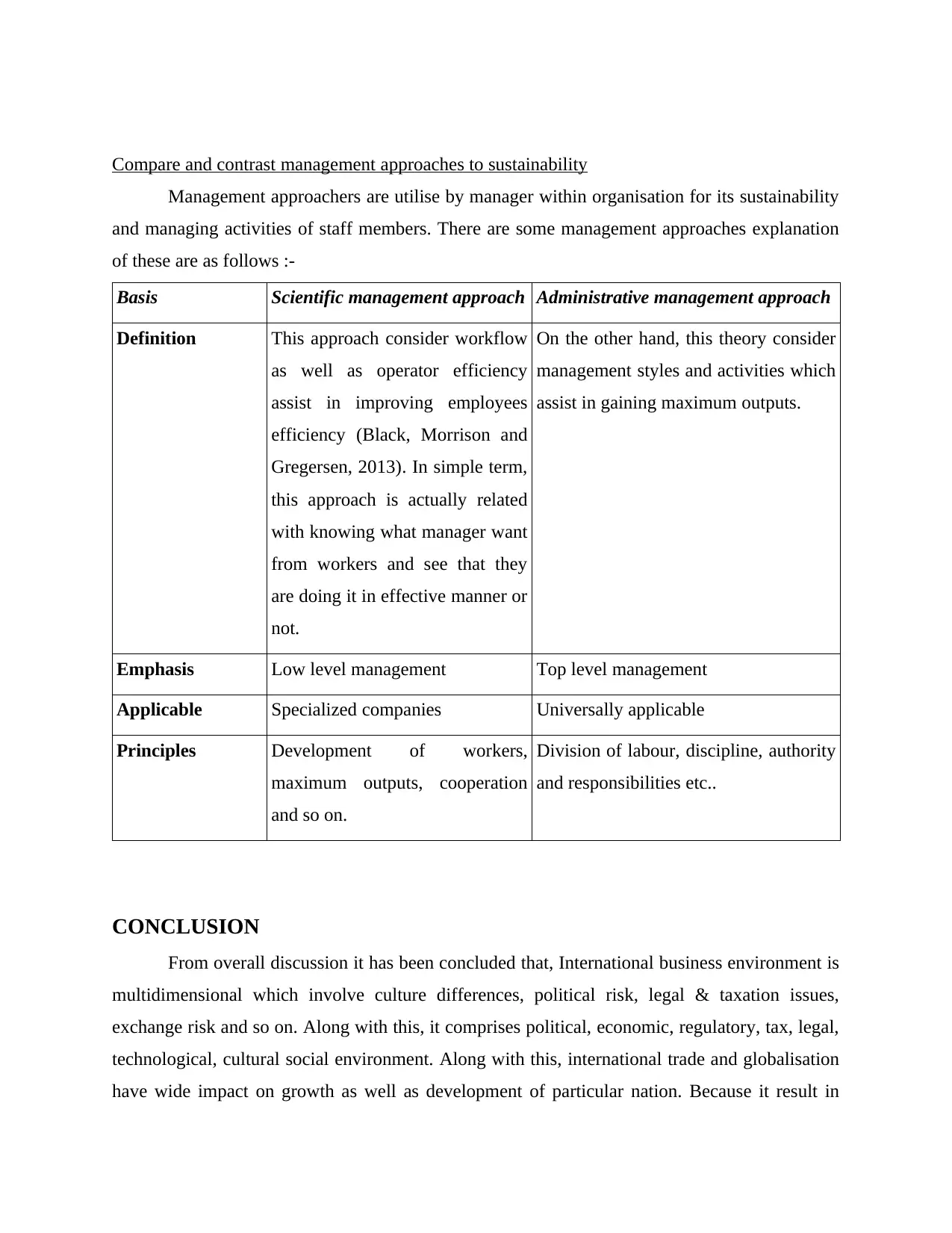
Compare and contrast management approaches to sustainability
Management approachers are utilise by manager within organisation for its sustainability
and managing activities of staff members. There are some management approaches explanation
of these are as follows :-
Basis Scientific management approach Administrative management approach
Definition This approach consider workflow
as well as operator efficiency
assist in improving employees
efficiency (Black, Morrison and
Gregersen, 2013). In simple term,
this approach is actually related
with knowing what manager want
from workers and see that they
are doing it in effective manner or
not.
On the other hand, this theory consider
management styles and activities which
assist in gaining maximum outputs.
Emphasis Low level management Top level management
Applicable Specialized companies Universally applicable
Principles Development of workers,
maximum outputs, cooperation
and so on.
Division of labour, discipline, authority
and responsibilities etc..
CONCLUSION
From overall discussion it has been concluded that, International business environment is
multidimensional which involve culture differences, political risk, legal & taxation issues,
exchange risk and so on. Along with this, it comprises political, economic, regulatory, tax, legal,
technological, cultural social environment. Along with this, international trade and globalisation
have wide impact on growth as well as development of particular nation. Because it result in
Management approachers are utilise by manager within organisation for its sustainability
and managing activities of staff members. There are some management approaches explanation
of these are as follows :-
Basis Scientific management approach Administrative management approach
Definition This approach consider workflow
as well as operator efficiency
assist in improving employees
efficiency (Black, Morrison and
Gregersen, 2013). In simple term,
this approach is actually related
with knowing what manager want
from workers and see that they
are doing it in effective manner or
not.
On the other hand, this theory consider
management styles and activities which
assist in gaining maximum outputs.
Emphasis Low level management Top level management
Applicable Specialized companies Universally applicable
Principles Development of workers,
maximum outputs, cooperation
and so on.
Division of labour, discipline, authority
and responsibilities etc..
CONCLUSION
From overall discussion it has been concluded that, International business environment is
multidimensional which involve culture differences, political risk, legal & taxation issues,
exchange risk and so on. Along with this, it comprises political, economic, regulatory, tax, legal,
technological, cultural social environment. Along with this, international trade and globalisation
have wide impact on growth as well as development of particular nation. Because it result in
⊘ This is a preview!⊘
Do you want full access?
Subscribe today to unlock all pages.

Trusted by 1+ million students worldwide
1 out of 13